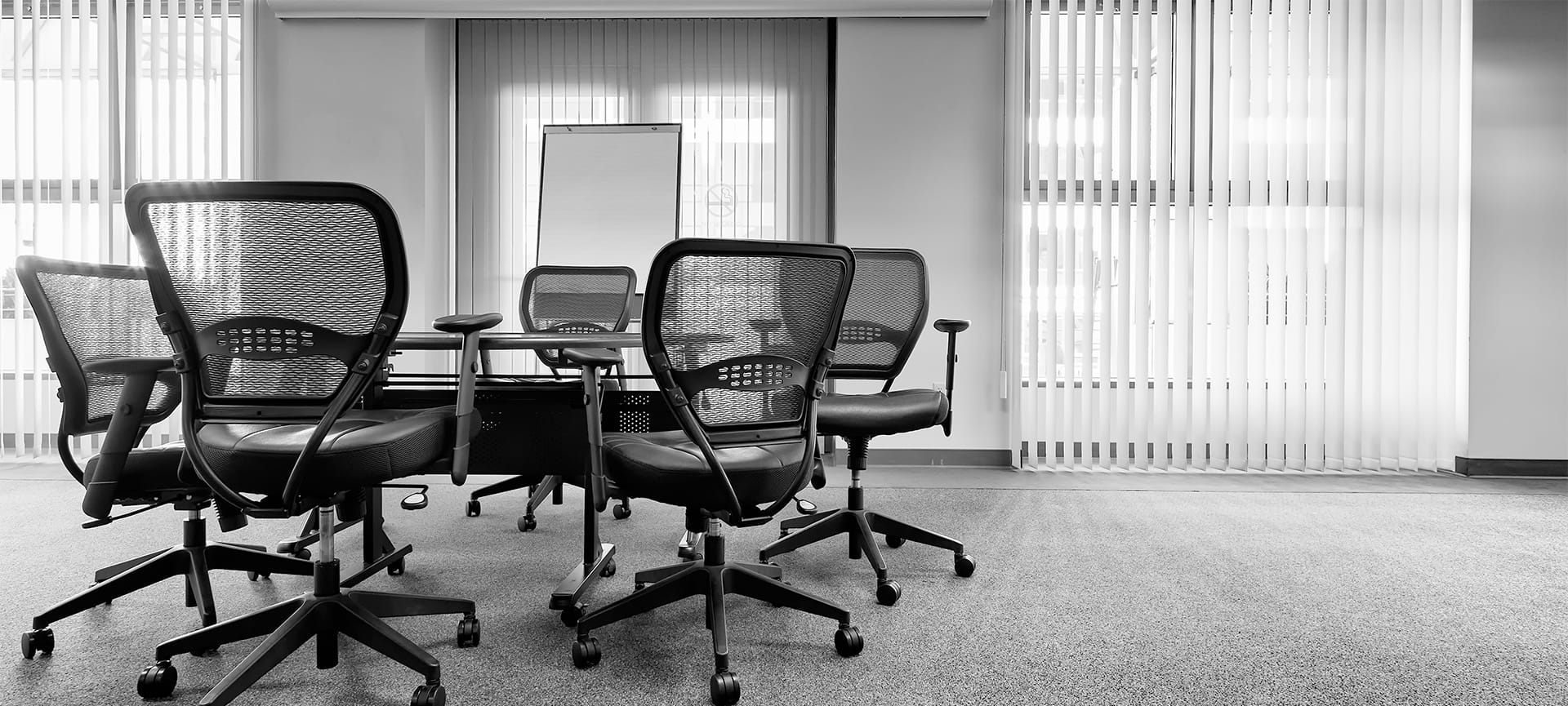The Role of Blinds in Enhancing Office Acoustics
Did you know that 80% of office workers report being negatively impacted by noise in their workplace? This issue is particularly pronounced in the vibrant heart of Toronto, where towering glass structures define the skyline.
The modern office, often designed with open floor plans and sleek surfaces, can become an echo chamber of distractions. Ringing phones, clacking keyboards, the murmur of conversations, and the relentless hum of traffic from outside – all contribute to a symphony of sound that can stifle productivity and creativity.
Yet, an elegant and often overlooked solution exists amidst this cacophony: window blinds. More than mere aesthetic enhancements, the right blinds can significantly transform the acoustic landscape of your office, creating a haven of focus and collaboration.
Understanding Office Acoustics
Understanding sound behaviour is paramount in office acoustics. Like ripples in a pond, sound waves travel outward from their source, colliding with surfaces in their path. Hard, smooth surfaces like glass, concrete, and drywall act as acoustic mirrors, reflecting sound waves into the space. These reflections create echoes, a familiar phenomenon in empty rooms or spaces with high ceilings.
In the context of modern offices, with their expansive windows and glass partitions, this poses a unique challenge. Large windows act as giant reflectors, amplifying noise and creating a reverberant environment where sound lingers and builds upon itself. This can lead to a sense of auditory chaos, making it difficult to concentrate, communicate, or simply relax.
To address these challenges, we turn to the fundamental principles of acoustics:
Sound Absorption
This refers to a material’s ability to convert sound energy into heat, thus reducing the amount of sound reflected in the room. Soft, porous materials like fabrics, carpets, and specialized acoustic panels excel at absorbing sound.
Diffusion
Diffusers scatter sound waves in multiple directions, preventing them from concentrating in one area and reducing the intensity of echoes. Certain blinds can act as effective diffusers with their textured surfaces or angled slats.
Reflection
While excessive reflection is problematic, a degree of reflection is necessary for sound to travel and be heard. The goal is strategically managing reflections, directing them away from work areas and towards absorptive or diffusive surfaces.
The Impact of Noise on the Workplace
The relentless hum of a noisy office can significantly affect employee well-being and a company’s bottom line. Research from the University of California, Berkeley, found that even moderate office noise levels can reduce productivity by up to 66%. Employees struggling to concentrate amidst the din often report increased stress, fatigue, and difficulty completing tasks effectively.
Beyond the immediate productivity loss, excessive noise poses several health risks. Prolonged exposure can lead to stress-related illnesses, such as hypertension and cardiovascular disease. Noise-induced hearing loss (NIHL) is also a concern, with office workers increasingly at risk due to constant exposure to moderate noise levels.
The financial implications are equally alarming. Decreased productivity translates to reduced output and missed deadlines, impacting project timelines and profitability. Moreover, the stress and health issues caused by noise can lead to increased absenteeism and employee turnover, incurring additional costs for recruitment and training.
A study published in the Journal of Occupational and Environmental Medicine estimated that noise-related productivity loss costs Canadian businesses billions of dollars annually.
Blinds as Acoustic Solutions
Enter window blinds, not merely as decorative elements but as acoustic allies. Certain materials and designs inherently possess sound-absorbing qualities. Fabrics, particularly those with a dense weave or textured surface, can trap sound waves within their fibres, converting their energy into heat and thus mitigating noise.
Related Article: Do Blackout Blinds Keep a Room Cool in the Summer?
With their unique honeycomb structure, cellular shades are particularly adept at this. The air pockets within the cells act as miniature sound traps, absorbing sound energy and preventing it from bouncing back into the room. This makes cellular shades an excellent choice for open-concept offices or spaces with hard flooring.
Some blinds contribute to sound diffusion in addition to absorption. For instance, the angled slats of Venetian blinds can scatter sound waves in multiple directions, reducing their intensity and minimizing the harshness of echoes. Similarly, Roman shades, with their fabric folds and pleats, create irregular surfaces that disrupt the path of sound waves, further enhancing acoustic comfort.
Beyond their acoustic properties, blinds also contribute to a quieter environment by addressing a more subtle form of noise pollution: visual distractions. By blocking out external stimuli, blinds create a sense of enclosure and privacy, allowing employees to focus on their tasks without the constant visual bombardment of the outside world.
The Multifaceted Benefits of Blinds
The benefits of incorporating blinds into your Toronto office extend far beyond simply muffling noise. When sound pollution is tamed, productivity flourishes. Employees find it easier to concentrate, collaborate, and communicate effectively, leading to improved work quality and faster project completion. A quieter workspace fosters a sense of calm, reducing stress and promoting overall well-being.
Beyond the practical benefits, blinds also elevate the aesthetic appeal of your office. With a wide array of colours, textures, and patterns, blinds can complement your existing décor and create a more inviting and professional atmosphere.
Furthermore, certain blinds offer insulating properties, helping regulate temperature and potentially reducing energy consumption. By minimizing heat gain in the summer and heat loss in the winter, blinds can contribute to a more comfortable and energy-efficient workspace.
Related Article: The Role of Blinds in Energy Efficiency at Home
Quiet Spaces, Productive Places
Ready to transform your office into a haven of productivity and well-being? Explore Blinds Toronto‘s extensive selection of acoustic solutions designed specifically for Toronto’s unique urban environment challenges.
Don’t let noise hold your business back. Contact us today for a complimentary consultation and discover how their expertise can elevate your workspace. Invest in silence; invest in success. Your employees – and your bottom line – will thank you.

Just another writer from downtown Toronto. I have worked as a window salesman and a blinds installer so I have a great amount of knowledge in this industry.
Favourite Downtown Restaurant: Lee’s
Blinds of choice: Zebra Blinds
Feel free to share my blogs if you find them useful.


